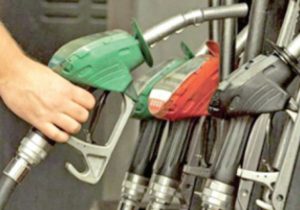As a result of not being able to fully recover the Gas Infrastructure Development Cess (GIDC) from big businesses, Pakistan has promised the International Monetary Fund (IMF) that it will raise the petroleum tax collection to a record Rs 920 billion this fiscal year.

Authorities in the finance ministry told The Express Tribune that during the just-ended review talks, the government promised the IMF that it would add another 50 billion rupees to the annual goal of 869 billion rupees for the petroleum levy. The higher fee collection is expected to make up for the loss of money from sources other than taxes, they said.
Every liter of gasoline and diesel costs the government Rs60 in additional taxes. In its budget, it planned to collect Rs869 billion in this area, but it has now promised to raise that amount to roughly Rs920 billion.
Since it is an automatic tax, the fuel levy has become the government’s main source of tax revenue.
It took the government 367% longer than the same quarter last year to collect Rs222 billion in petroleum tax in the first quarter.
Contacted, Qamar Abbasi, a spokesman for the finance ministry, said that the government did not promise the IMF that the fuel levy rates would go up even more and would stay at Rs60 per litre.
The representative also said that using petroleum products decreased less than anticipated. As a result, the yearly revenue would stay higher than the planned Rs869 billion.
In spite of persistent double-digit inflation, the government has not decided to lower fuel prices, which are still very close to all-time highs.
The most pricey items in the Sensitive Price Index—those mostly bought by people with lower incomes—went up almost 10% in just one week because gas prices for the poorest families in the country went up by 480%.
According to the sources, the GIDC’s income goal has been lowered from Rs50 billion to Rs30 billion, even though the finance ministry has promised to raise the levy collection by another 50 billion rupees.
The highest court threw out the GIDC. The companies did, however, collect Rs416 billion by December 2018 but did not put it into the national fund.
Imran Khan, who used to be prime minister, issued a Presidential Ordinance in September 2019 to put off half of the Rs416 billion obligation. When the media criticized the PTI government’s controversial ordinance, they took it back and chose to go to court to settle the Rs416.3 billion debt.
In September 2019, the PM Office released a statement saying, “The ordinance was made with the goal of recovering 50% of the stuck revenue through an out-of-court settlement after consultation with the industry.”
The Supreme Court overturned the GIDC law. The highest court also turned down the federal government’s questionable plea for review.
From 2019 to now, only Rs80 billion of the Rs416 billion was recovered, according to the reports. Regarding the outstanding amount of about Rs337 billion, it was earlier thought that Rs40 billion would be recovered. Unfortunately, this goal has been lowered by another 10 billion rupees.
By 2019, the fertilizer companies owed about Rs138 billion. That time, the textile sector owed a total of Rs42.5 billion. In 2019, captive power plants owed 99.4 billion rupees. The natural gas industry due Rs80 billion.
Several court cases made it harder for the finance ministry to collect the GIDC arrears, according to a spokeswoman.
As a result of higher petroleum levy collections, the goal for non-tax revenues has been cut by Rs97 billion, down from an earlier estimate of Rs2.1 trillion.
According to them, FBR’s goal to receive Rs9.415 trillion in taxes stayed the same after the review talks. Within the overall goal of collecting Rs9.415 trillion, the aim for income tax collection has been raised by Rs346 billion to make up for the shortfall in the other three taxes.
Revised goal for income tax collection is Rs4.23 trillion, which is 45% of the overall amount collected. The yearly goal for collecting sales tax has been cut by 196 billion rupees, the goal for collecting customs duties has been cut by 117 billion rupees, and the goal for collecting federal excise duties has been cut by 34 billion rupees, according to multiple sources.
Since imports are getting smaller, the FBR told the IMF that its collection at the import stage will go down. This will be balanced out by higher income collection at the domestic stage.










































